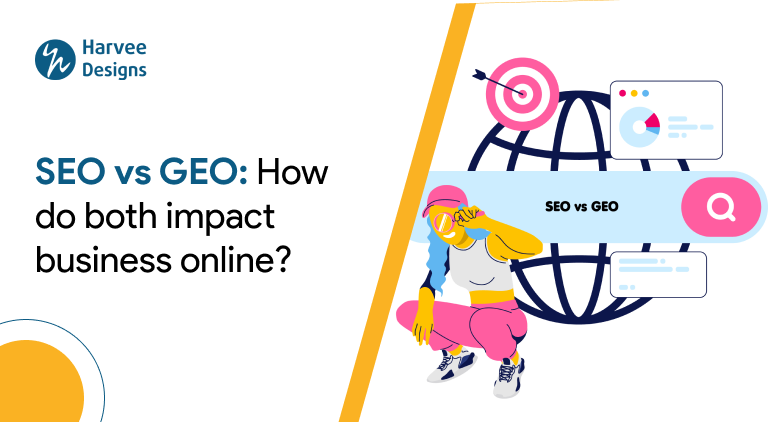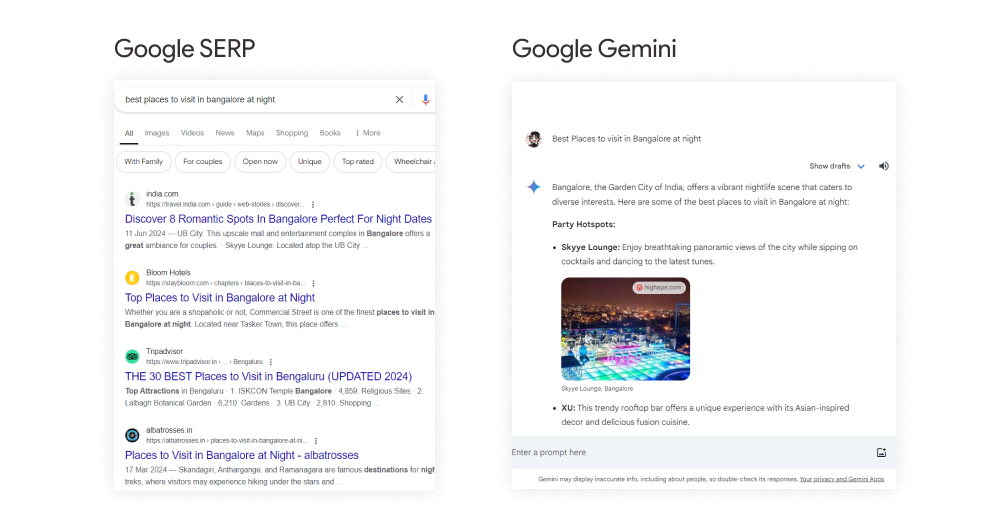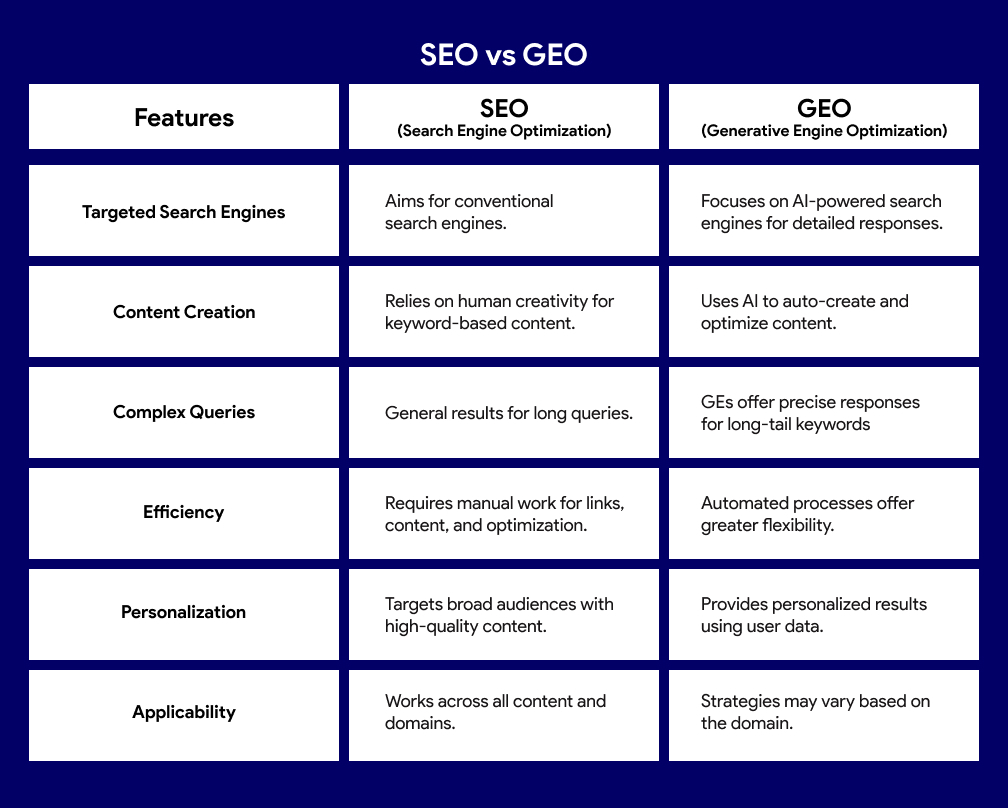
GEO (Generative Engine Optimization) Vs SEO (Search Engine Optimization): How Do Both Impact Business Online?
Consider the website you own like a book in an extensive library. What are your strategies for ensuring that readers who are looking for it will find it? SEO (search engine optimization) and GEO (generative engine optimization) are helpful here.
Although the primary goals of both methods are the same—to increase online presence and drive traffic—they use different approaches to achieve them. But what differentiates this new discipline from standard Search Engine Optimization (SEO)?
This blog will discuss GEO vs SEO, the impact of SEO and GEO strategies on companies, and how combining the two can significantly transform the field you work in.
What is SEO? and What is GEO?
SEO: Search Engine Optimization
The main goal of the SEO process is to optimize websites to rank better in standard search engine results pages (SERPs). It increases a website’s value to search engines and users through several strategies and methods, such as technical optimization, link building, content optimization, and keyword research.
GEO: Generative Engine Optimization
Generative Engine Optimization is a relatively recent idea that has arisen as a result of content optimization methods being revised in response to the rise of generative engines, which are AI-driven search engines. GEO also involves offering consumers content or advertisements based on their geographic location.
What is a Generative Engine?
Generative engines use large language models to collect and combine data from various sources, including text, video, and infographics, to provide thorough answers to user questions rather than just an information search.
Notable examples include Gemini (formerly Bard), Bing Chat, and Google SGE.
Understanding SEO and GEO
For instance, you have an online business and a website for that, but people have difficulty finding you on Google or other search engines. This is where SEO gets into work.
SEO is all about optimizing your website to increase its visibility and thereby increase your website’s rank on Google’s Search Engine Result Page (SERP).
However, when you apply artificial intelligence to produce content for your regional business that connects to consumers, this is where GEO comes into play.
GEO is the process that optimizes content so that it appears more frequently in the results that these AI-powered search engines provide, and since it uses geographical data to give users accurate data.
The goal of SEO is to raise your position on conventional search engines like Google. However, GEO focuses on showing up in AI-generated responses from recent tools such as BingChat and Google’s Gemini.
Difference between SEO and GEO
Targeted Search Engines: The critical difference between SEO and GEO is found in the kind of search engines they aim for.
For example, SEO aims to improve your visibility on conventional search engines, which display websites based on user queries. In contrast, GEO is made for AI-powered search engines that produce detailed responses.

Content Creation: SEO mainly depends on human creativity and experience to create content that complies with search engine algorithms and keyword strategies. GEO, on the other hand, automatically creates and optimizes content using AI.
Complex Queries: Search engines frequently return general results for long and detailed queries. Because of the development of generative engines (GEs), responses are now more precisely adjusted to match long-tail keywords.
Efficiency: Generating links, creating content, and performing technical optimization for SEO might take a lot of work. GEO, however, provides more flexibility because of its automated procedures.
Personalization: SEO focuses on reaching as many people as possible through high-quality content and keyword targeting. By examining unique user information and interests, GEO is exceptional at providing personalized services.
Applicability: SEO techniques are universally applicable to all kinds of content and domains, but GEO strategies could change based on the domain.

Impact of SEO Vs. GEO on Business
SEO helps increase online presence and build relationships that last, while GEO marketing enables customized, location-specific engagement.
Long-term authority and visibility can be developed through SEO, and GEO marketing can help you focus your efforts to target the right people in the right places.
For instance, a business can employ GEO marketing to advertise specific events or discounts at its regional branches while still ranking highly in organic searches worldwide.
By combining SEO and GEO, small—and medium-sized enterprises can reach a large online audience and turn visitors into local clients.
For instance, a web-based shop could use SEO techniques to draw customers from all over the country but then utilize GEO strategies to provide customers with location-specific offers or discounts.
Connecting SEO and GEO: Enhancing Local Visibility
GEO and SEO are related, not opposing. The secret to increasing internet presence is to understand the differences between them. Even if SEO is still important for conventional search engines, GEO is becoming more and more important in the age of AI-powered search.
You can guarantee that your website is quickly discovered and acknowledged as a trustworthy source, whether in search results or AI-generated responses, by producing content that supports both. You can maintain your lead in search in the future by adjusting to these changes.
Conclusion
Depending on a business’s objectives and particular demands, SEO or GEO should be chosen. Knowing the key difference between SEO and GEO helps develop a precise marketing strategy.
Businesses could create a more focused, successful marketing plan that connects with their audience—whether local or worldwide—by knowing how both operate and how they could complement one another.
FAQ
Frequently Asked Question
Generative Engine Optimization (GEO) is the process of optimizing material for search engines that employ generative models and artificial intelligence (AI) to produce results. Improving visibility in search engine results involves personalizing content to fit user purposes and preferences.
Search engine optimization, or SEO, is not being replaced by GEO (Generative Engine Optimization); rather, it is being upgraded. While SEO concentrates on conventional methods to raise a website's search engine ranking, GEO combines creative technology and artificial intelligence (AI) to improve content production and optimization tactics.
GEO (Generative Engine Optimization) aims to raise content visibility and ranking in search engines driven by artificial intelligence. Its main goal is to improve the entire search experience by matching material to user intent.
In SEO, GEO tagging adds geographic data to videos, photos, or content to show where they are. This aids search engines in determining how relevant the content is to particular regions. Businesses can boost their local search presence and draw highly targeted traffic by utilizing GEO tagging.
In SEO, a GEO sitemap provides geographic details about a website's content to assist search engines in determining how relevant it is to a certain place. It includes information such as location tags, latitude, and longitude. This draws consumers looking for location-specific content and increases local search visibility.




